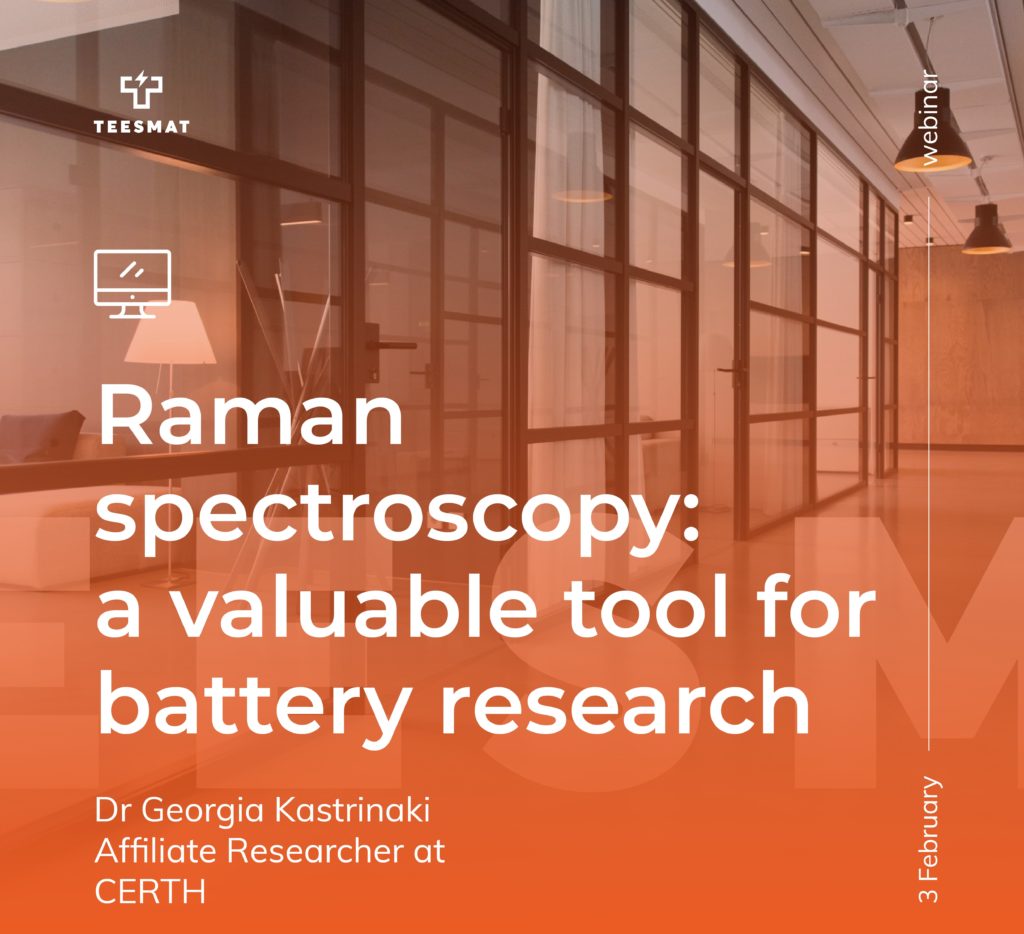Webinar - Raman spectroscopy: a valuable tool for battery research
TEESMAT WEBINAR SERIES

3 FEBRUARY 2022, 15:00-16:00 CET
Join the conversation! Register to our webinar for free!
TEESMAT project organises a series of webinars with the Service Providers presenting the characterization techniques and user cases.
The fIfth webinar, titled ‘Raman spectroscopy: a valuable tool for battery research‘, will be presented by the expert Georgia Kastrinaki from the Centre for Research and Technology-Hellas – CERTH.
The recording of the webinar can be found here
The topic
After a brief introduction of the TEESMAT project framework, the webinar will focus on the Raman spectroscopy characterization technique available at the Centre and Research Technology Hellas, which can be applied for energy related material analysis.
Raman Spectroscopy (T16) can be used as complementary tool for material analysis at the Solid Electrolyte Interface and Cathode Electrolyte Interface at the microstructural level. The technique can provide ex situ/post mortem as well as operando analysis capability. The comparison of fresh and aged energy storage structure analysis provides insight into the ageing mechanisms during cycling; on the one hand on chemical composition level by alteration of the molecular bonds and on the other hand on the microstructure of the electrodes by mapping analysis through chemical images based on the active and conductive material interfaces.
An overview of the technique along with a theoretical explanation of its ground principle will be given by an expert. This will be discussed with respect to applications as well as practical limitations through battery case study presentations.
Raman spectroscopy characterization technique
Raman spectroscopy is a non-destructive optical technique that can provide chemical and structural information of many materials. Within the TEESMAT project it is employed for the characterization of battery electrode materials (e.g. carbonaceous matter, metal oxides, polymers, etc). The technique follows the interaction of monochromatic light (a laser beam) with a sample providing a spectrum characteristic of the specific vibrations of the molecules that are present in the sample. Coupled to a confocal microscope, high spatial resolution and high sensitivity can be achieved, allowing the study of phase changes and identification of intermediate species in reactions during in-situ and operando measurements.
In addition, Raman mapping and imaging enables the study of the distribution of materials e.g. on electrode surfaces, or across cross-sections, providing valuable information on the phases involved in charge/discharge cycles and their spatial distribution at the microscale. The resulting data can be quantified, by various metrics such as fraction estimates and domain size (e.g. particle) statistics to understand battery behaviour and develop ways to improve its efficiency.
The speaker
Dr Georgia Kastrinaki is a Physicist with a PhD in Mech. Engineering and a MSc in Material Science. She is an Affiliate Researcher at CERTH, with 15 year experience in material synthesis and characterization for energy, environmental and toxicological applications. She has been involved in the synthesis and evaluation of next generation Li-ion materials for electric vehicle application and is familiar with a variety of tools for on-line ex-situ material characterization. She has participated in more than 10 EU and national research projects related to green mobility and energy production and is the author of more than 25 publications in peer-reviewed scientific journals.
Practical information
Date & Time: 03 February 2022, 15:00-16:00 CET
Location: Online
Registration: Participation is open to all interested parties, please register on this page.
_______________________
About TEESMAT
Energy is one of the keystones of prosperity in the European Union. Access to advanced characterisation solutions enables industry to apply a knowledge-based approach, which is essential to accelerate innovation and reduce the cost of technologies.
Battery energy storage plays a major role in the ongoing transition to a decarbonised and clean energy system. The development of a competitive battery value chain in Europe is one of the top priorities of the European Commission.
TEESMAT – the Open Innovation Test Bed for Electrochemical Energy Storage Materials – brings a comprehensive response to the critical bottlenecks faced by EU stakeholders in the field of electrochemical energy storage materials. It leverages EU know-how & expertise from 11 countries and facilitates access to physical facilities, usable data, and industrially relevant services based on novel characterisation solutions.
The main impact of TEESMAT lays in setting up & implementing a financially sustainable Open Innovation Test Bed whose techniques and services address diverse problems faced in the development of clean, safe, high-performance battery solution.
Be part of TEESMAT community. W: www.teesmat.eu | T: @Teesmat_EU | In : TEESMAT
TEESMAT is an EU project that has received funding from the H2020, under Grant Agreement n 814106 (H2020-NMBP-TO-IND-2018).
